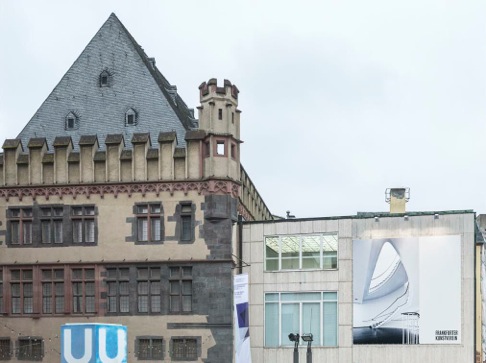What Can Film Do? – Images of Our Society and Times in Contemporary Cinema
08.12.2011
*Sebastian Schipper (Film director) in conversation with Prof. Martin Seel, Moderation: Peter Siller*
There is no medium more powerful than film. It is here that images of our times and our society are created, becoming etched in our memory. In this way, reality not only shapes fiction but fiction also shapes reality. After 9/11 and in times of financial crisis, we ask: What kind of social systems do we encounter in today’s cinema? What narratives about our society are being shown? Addressing these questions, the focus of the 7th Frankfurter Stadtgespräch has been on broad-impact blockbusters such as “The Dark Knight” (2008) by Christopher Nolan or “Avatar” (2009) by James Cameron (2009), but also on less commercially successful movies such as “In the Valley of Elah” (2007) by Paul Haggis. Participating in this discussion are the director and actor Sebastian Schipper (“Absolute Giganten”, respectively “Drei”), and the philosopher and film theoretician Martin Seel (“Theorien”; “112 Tugenden, 111 Laster”) – two of the most distinguished protagonists in German film and film theory today. An evening of investigation into the interpretive power of cinema, with its bright and its dark sides.
*Sebastian Schipper* is a crossover artist between film director and drama. With his director debut Absolute Giganten (1999) he coined a whole generation, Ein Freund von mir (2006) and Mitte Ende August (2008) followed. As an actor he appeared in Kleine Haie (1992), The English Patient (1996), Winterschläfer (1997), England! (2000), Die Nacht singt ihre Lieder (2004) or Drei (2010). He studied acting at the Münchner Otto-Falckenberg-Schule (1992-95) and had theater engagements at the Münchner Kammerspielen inter alia.
*Martin Seel* is one of the most prominent German contemporary philosophers in the areas of aesthetics and practical philosophy. In the context of his aesthetic and ethical deliberations he is enganged intensely in theory and practice of film. With his newspaper columns, but above that in his books „Theorien“ (2009) und „111 Tugenden, 111 Laster: Eine philosophische Revue“ (2011) he wins over his audience, so that it exceeds the expert readers by far. Seel studied German studies, Philosophy and History in Marburg and Konstanz. 1984 he did his Ph.D. with Albrecht Wellmer. 1990 his habilitation followed in Konstanz. As Professor for Philosophy he taught from 1992 to 1995 at the University of Hamburg, from 1995 to 2004 at the Justus-Liebig-University Gießen. 2004 he bacme Professor for Philosophy at the Goethe University in Frankfurt. Above that since 2007 he is founding member of the Cluster of Excellence „The Emergence of normative orders“ at the Goethe University Frankfurt am Main.
*Peter Siller* (* 1970) is Scientific Manager of the Cluster of Excellence `The Formation of Normative Orders’ at the Goethe University Frankfurt am Main. Formerly he was the director of the domestic divisions of the Heinrich Böll Foundation and a member of the planning staff at the German Foreign Ministry. He studied law and philosophy. In addition he is founder and managing editor of the journal `polar’ which appears twice yearly in the Campus Verlag (www.polar-zeitschrift.de). He numerous publications on political philosophy and practice include `Rechtsphilosophische Kontroversen der Gegenwart’ (1999), `Politik als Inszenierung’ (2000), `Zukunft der Programmpartei’ (2002), `Arbeit der Zukunft’ (2006), `Politik der Gerechtigkeit’ (2009).
The Stadtgespräch is part of a series organized by the Frankfurt University Cluster of Excellence “The Formation of Normative Orders” in cooperation with the Frankfurter Kunstverein.

